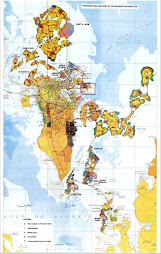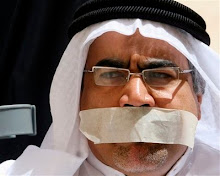Bahrain charges dozens with attempted murder, rioting after Shiite protests
The Associated Press
Thursday, December 27, 2007
MANAMA, Bahrain: More than a dozen people detained during recent Shiite protests were charged Thursday with attempted murder, illegal assembly and rioting, a defense lawyer and a local rights group said.
Defense lawyer Mohammed al-Jashi said three people were charged with attempted murder in clashes with riot police, and 11 with illegal assembly and rioting.
The Haq Movement for Liberty and Democracy said in a statement that 31 of those arrested were charged with illegal assembly, rioting, theft of weapons and ammunition, and illegal possession of arms.
The discrepancy in the numbers of those charged could not immediately be reconciled. The Haq Movement on Thursday put the number of detainees at 50 and listed their names.
Shiites account for about 70 percent of Bahrain's 450,000 citizens, but the ruling family is Sunni. Economic disparities between the ruling elite and the poorer majority have contributed to feelings of marginalization among Shiites, who have waged an occasionally violent campaign against the government.
The charges followed arrests in police raids in the wake of last week's demonstrations, which erupted after the death of Bahraini protester who took part in a rally commemorating social unrest in the 1990s.
Demonstrations broke out at the man's funeral and then at memorial services which resulted in severe clashes with security services.
It was not immediately clear when those charged would stand trial. Under Bahraini law, attempted murder carries a maximum of 25 years in jail.
Some relatives of the detainees Shiites also gathered Thursday near the prosecutors office demanding to visit their relatives. The Haq Movement said sit-ins were also held in three other areas demanding the release of the detainees.
Resentment among Bahrainis is also high over alleged government policy of granting citizenship to Sunnis from Syria, Iraq, Yemen and the Baluchistan province in Pakistan and giving them housing and jobs, often in the security forces.
skip to main |
skip to sidebar

خارطة البحرين الجديدة
Facebook Badge
Followers
فسيلة السنكيس
متى ما ظهرت الفسيلة - الصغير من النخل- من فوق سطح الأرض، فمن حقها أن تنمو وان تعانق السماء دون حصار أو مضايقة أو استهداف
حق الفسيلة في الحياة كحق غيرها، من المخلوقات، خاصة وإن كانت دليل أصالة شعب كشعب البحرين
--------------------------------------------------------------
صاحب المدونة: د.عبدالجليل السنكيس
ناشط، كاتب وباحث أكاديمي من البحرين
البريد الإلكتروني: asingace@gmail.com
مدونة اخرى: http://alsingace.katib.org/
هاتف:8179-3966-973+
حق الفسيلة في الحياة كحق غيرها، من المخلوقات، خاصة وإن كانت دليل أصالة شعب كشعب البحرين
--------------------------------------------------------------
صاحب المدونة: د.عبدالجليل السنكيس
ناشط، كاتب وباحث أكاديمي من البحرين
البريد الإلكتروني: asingace@gmail.com
مدونة اخرى: http://alsingace.katib.org/
هاتف:8179-3966-973+
مواقع ووصلات ذات صلة Links of Interest
صور معبرة

خارطة البحرين الجديدة






